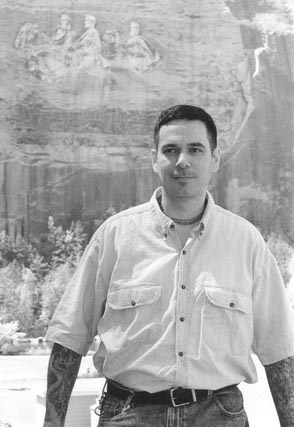Thursday, December 28, 2006
Bhaiya kakku [pictured at right with a bucket of crabs ] takes me out for a walk. He wants to show me another pandal located nearby. The sun has gone down and he is clearly under the influence of some cheap liquor. I feel sad that his life has come to this.
When he stops and introduces me to a police man on traffic duty, I am worried. The cop probably knows him, but I can’t help feeling that it is a mistake for Bhaiya kakku to voluntarily gossip with a police officer in his condition. We’re standing in the middle of the avenue and the cop is obviously quite busy as the streets are bustling with traffic. Still, the cop seems unaffected and simply asks me, “Where are you from?” which diffuses the situation. Soon we are on our way to the pandal.
Just down the street from where the festivities are taking place, we arrive at an old Calcutta building, with a cement exterior offset by bas-relief columns. The windows have wooden shutters behind the metal grills installed for security. I am informed that this house belongs to a friend of Bhaiya Kakku.
Our Uncle’s friend answers the door and greets us warmly. In the front room, the entire family is seated around a coffee-table on which tea cups and sweets are neatly arranged. I feel terribly embarrassed to barge in on the family holiday, but everyone seems to take it well and their hospitality is evidence of their character.
Introductions are made and I am invited to sit. Immediately I am put at ease when our host puts his hand on our uncle’s shoulder and jokes, “I can see that Bhaiya is full of the holiday spirits.” I am offered some sweets and water. Naturally, polite conversation follows.
This is the real Calcutta. The one I told you that cannot be found in tour guides, hotels, and tourist traps.
Although a complete stranger to these people, they are perfect hosts and I am taken by their friendly natures as we exchange views and tell stories about the city we all love. They are happy to see that I am very fond of Calcutta and enjoy hearing my impressions of their city.
In the Bengali language, a guest is technically known as “Atithi Bhagavan.” Literally translated, it means “God, Who can arrive at any time.” In fact, the Vedic literatures are full of stories where some deva [a demigod, similar to an angel] shows up unexpectedly at someone’s house as a test. It’s usually at the worst time and in the most unusual manner; a beggar, an untouchable, or an enemy who must arrive during an important religious ceremony, or just after a month-long fast and requesting the host’s last morsel of food.
The moral of the story is always the same: receive any guests as if he is God, Himself.
Although our visit is a short one, I feel changed by the experience. I have learned how badhrolok (gentlepersons) receive unexpected guests and that knowledge is a far more valuable souvenir than anything one might buy at New Market. Moreover, it’s duty-free and you don’t have to worry about it fitting in the overhead luggage bin.
Subscribe to:
Post Comments (Atom)


No comments:
Post a Comment